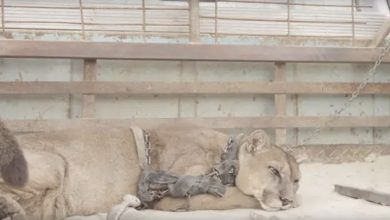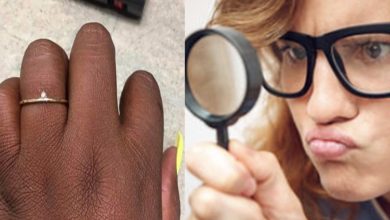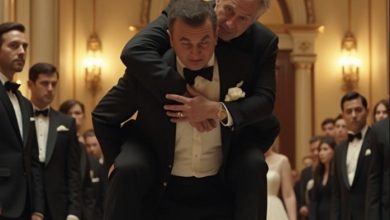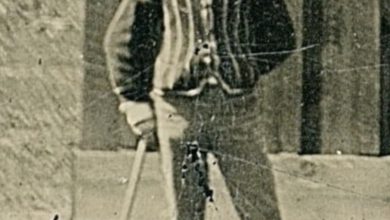“My In-Laws Tried to Erase Me the Morning After the Funeral — Then My Husband’s Lawyer Arrived and Read His Final Letter”
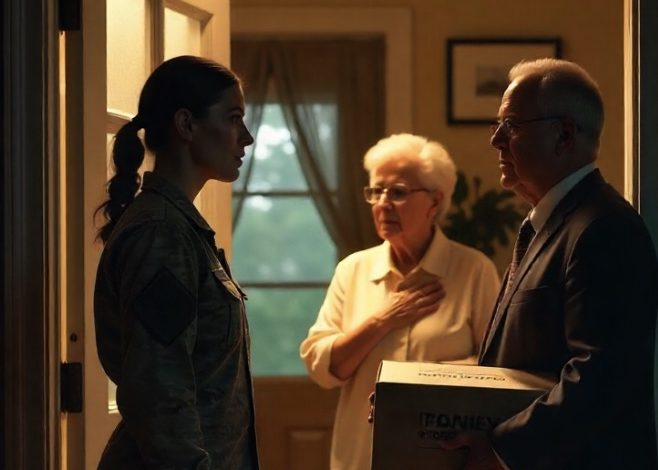
The morning after my soldier husband’s funeral, I returned to a house that no longer felt like mine. The flag they had handed me at the gravesite was still folded tightly in my arms, its edges pressed against my chest as if it could somehow hold me together. But when I stepped out of the car and looked up the driveway, I saw a locksmith’s van parked in front of the house. My stomach dropped.
When I opened the front door, I heard the unmistakable sound of boxes being taped shut and furniture scraping across the floor. Then I saw him—my father-in-law, Raymond Coleman—standing in the middle of the living room with a clipboard in one hand and a cigar in the other. His sharp voice cut through the air. “Blood family only,” he said without even looking at me. “Your time here is over.”
Behind him, movers were hauling out my furniture, the same pieces Marcus and I had chosen together. His mother, Patricia, walked down the stairs holding my jewelry box as if it were something filthy. “We’ll let you take this,” she said sweetly, her lips curling. “We wouldn’t know what to do with such… standard things anyway.”
I froze in the doorway, still in uniform, still reeling from the funeral. “What do you think you’re doing?”
Raymond turned to me slowly. “Marcus may have married you, Molly, but he couldn’t make you a Coleman. This is our family’s home—our blood, our legacy. You can pack your personal things. The rest stays.”
The words sank in like ice water. But I didn’t yell. I didn’t argue. Years of military training had taught me that silence can be a weapon. You don’t panic under fire—you wait, you observe, and then you strike.
I watched them as they carried out my grandmother’s chair, my wedding photos, even the medals Marcus had helped me hang on the wall—my Bronze Star, my Purple Heart. Patricia wrinkled her nose at them. “Take those down,” she said to one of the movers. “They ruin the aesthetic.”
That was when something inside me hardened. They thought they could erase me. But they’d made one fatal mistake: they underestimated the woman Marcus married.
The Ambush
Just a few months before Marcus died, we had attended a cousin’s wedding together. It was one of those grand southern affairs—lace, champagne, oak trees glowing under fairy lights. After dinner, I had stepped outside to breathe, only to overhear voices on the veranda.
It was Raymond, speaking in a low, commanding tone. “When Marcus is gone, we’ll need to act quickly. The lawyer said a wife can stay if she wants, but we can make things… uncomfortable.”
My breath caught.
“She’s a soldier,” he continued. “Always moving, never staying long. All we have to do is remind her she doesn’t belong here.”
Then I heard Patricia’s laugh, light and cruel. “Oh, I’ll handle her,” she said. “A few sharp words in the right places, and she’ll leave on her own. You’ll see.”
I pressed myself against the wall, heart pounding. They weren’t just cruel—they were planning this.
When we got home that night, I told Marcus everything. I didn’t cry; I just laid out the facts, the way I would report intelligence. He went completely still. Then he said quietly, “They’ve declared war.”
He opened a leather briefcase I’d never seen before and pulled out a stack of papers. “I’ve been preparing for this for years,” he said.
It turned out that my husband—the kindest man I’d ever known—had quietly built a legal fortress around me. He had met with a lawyer named Charles Peyton, known in Charleston for his precision and power. Together, they had rewritten every document—our mortgage, the deed to his veterinary clinic, even the joint accounts—under something called Right of Survivorship.
Marcus smiled grimly. “The second I die, everything automatically transfers to you. No will. No court. No loopholes.”
Then he showed me a sealed letter. “This one,” he said softly, “is for them. In case they ever try to hurt you.”
That night, I promised him I’d hold the line. Six weeks later, I held his hand as cancer took him. And now, his parents were trying to finish what the disease had started.
The Confrontation
“Your time is over,” Raymond repeated. He blew out a cloud of smoke and waved toward the front door. “Two hours. After that, anything left becomes Coleman property.”
“Marcus built this house too,” I said quietly.
“With our money,” he snapped. “You don’t deserve a dime of it.”
He turned away, giving orders to his sons like a general commanding troops. But I wasn’t his soldier. I was something far worse for him—a strategist who already knew the next move.
I waited until he was done barking orders, then spoke in a voice so calm it made Patricia stop in her tracks. “You forgot one thing,” I said.
She turned, annoyed. “And what might that be?”
“The law,” I said simply.
They didn’t know that every word, every insult, was being recorded through a small device in my pocket—a habit from my work with internal investigations on base. They didn’t know that Charles Peyton already had copies of every deed, every clause, every signature Marcus had signed to protect me.
Raymond laughed. “Law? You don’t have a lawyer, girl.”
I smiled faintly. “Oh, I do.”
At that exact moment, the deep growl of an engine echoed outside. A black BMW pulled into the driveway, blocking the moving truck. The door opened, and Charles Peyton stepped out, crisp in a gray suit, every bit as intimidating as a general walking into a battlefield.
He walked straight past me and faced Raymond. “Are you Raymond Coleman?”
“I am,” Raymond said, puffing out his chest.
“I’m Charles Peyton,” the lawyer replied calmly, handing him a card. “I represent the estate of the late Marcus Coleman and his wife, Major Molly Martin.”
The title made Raymond flinch.
“I’m here because I was informed of a possible case of unlawful eviction, theft, and property damage,” Peyton continued. “I’d like to remind you that under South Carolina state law, this house and all related properties belong fully and solely to Major Martin.”
“That’s ridiculous!” Patricia barked. “Marcus would never—”
“He did,” Peyton interrupted sharply. He opened his briefcase and laid the deeds on the table. “Joint tenancy with right of survivorship. The instant Marcus Coleman passed, ownership transferred completely to Major Martin. You, sir,” he added, turning to Raymond, “are trespassing.”
The color drained from Raymond’s face. “You can’t be serious.”
“I’m entirely serious,” Peyton said. “And if the items removed from this house aren’t returned within ten minutes, I’ll be calling the police—and I’ll make sure they bring a camera crew from Channel 4 News.”
The silence was deafening. Then Patricia spoke, her voice trembling. “We didn’t mean any harm. We just thought—”
“You thought wrong,” Peyton said coldly. “And before you embarrass yourselves any further, I have one more thing to read.”
He reached into his case and pulled out the sealed envelope Marcus had left behind. “Your son asked that I read this in person, should you ever try something like this.”
He broke the seal and began.
“To my family: if you are hearing these words, it means I am gone. I loved you once, but the way you’ve treated my wife has shown me who you truly are. Dad, you taught me to fight for what’s mine, and so I did. Mom, you told me appearances matter more than people. You were wrong. The only thing that matters is loyalty, and Molly has given me that without fail. She stood by me when I was at my weakest. She is my family. You are not.”
Patricia gasped. Raymond’s cigar dropped from his hand.
“This home, this clinic, every piece of my life now belongs to her. And if you can’t respect that, then please respect this one final order from your son: Get out of her house.”
Peyton’s voice was steady as he read the last words. “Love, Marcus.”
He closed the letter and looked up. “You have five minutes,” he said quietly.
And for the first time, Raymond obeyed an order he didn’t give himself.
The Aftermath
Under Peyton’s supervision, the movers brought everything back. My chair. My medals. My grandmother’s blanket. Piece by piece, my life returned to where it belonged. Raymond avoided my gaze the entire time.
Before leaving, Patricia tried to speak. “Molly, we never—”
I stopped her with a raised hand. “Save it. You’ve said enough.”
Peyton smiled faintly. “Major Martin,” he said, “if you ever need legal representation again, call me. I don’t often meet people who stand taller than I do, even when I’m the one in the suit.”
After they left, I stood in the middle of the quiet house, finally able to breathe. For the first time since the funeral, it felt like home again—not because Marcus was gone, but because I had finally protected what we’d built together.
The Legacy
Weeks passed. Word spread through Charleston quickly. The proud Coleman family had been legally outmaneuvered by the soldier they tried to erase. Some people pitied them. Most admired me.
A month later, a courier delivered a letter from Raymond with a check for $100,000. “To make peace,” it said. I burned it in the fireplace and sent the ashes back.
Instead, I used Marcus’s old office to open The Marcus Coleman Memorial Veterinary Clinic. It became a safe place for veterans and their families—people who knew what it meant to lose and rebuild. I started a small charity, The Companion Fund, to help service members pay for their pets’ medical bills. That was Marcus’s dream, and now it was mine too.
One evening, while organizing his desk, I found another envelope—this one addressed to me. The handwriting made my heart stop.
My dearest Molly, it began. If you’re reading this, then you’ve already fought the battle I feared most. But remember—winning isn’t the end. It’s the beginning. Turn our home into a beacon. A place where others can find hope when they’re lost. You were my fortress, Molly. Now it’s your turn to be a lighthouse.
I stood by the window that night, looking out at the Charleston sky. The world was quiet. I had kept my promise.
I had held the line.
And now, every sunrise brings a new mission—not to fight, but to live, to heal, and to carry forward a legacy built not on blood, but on love, courage, and honor strong enough to light the way home.


